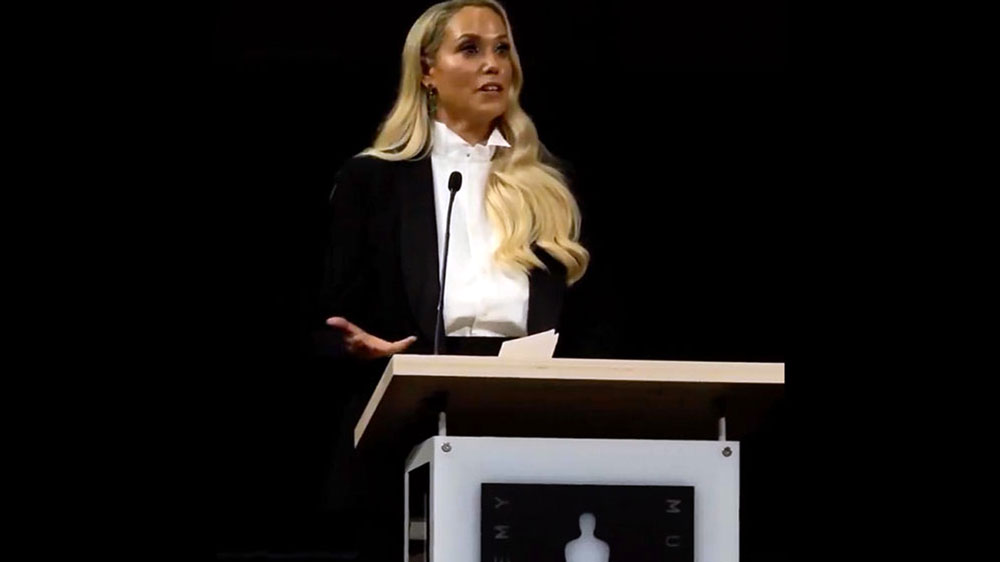
January 28, 2019
Nat Segaloff on Guarding, and Guiding, Hollywood Royalty
Kilian Melloy READ TIME: 10 MIN.
Nat Segaloff has worn a variety of hats in his career, from journalist to publicist to producer of audio dramas to television writer-producer. His 16 books (and counting) have mostly detailed fascinating, and hidden, corners of Hollywood, from a study of the final films of some of cinema's most acclaimed directors to an in-depth look at the legendarily prolific Stirling Silliphant to a biography of the late - and decidedly great - speculative fiction writer Harlan Ellison. Then there's that juicy tell-all that explores the life of a publicist...
Now Segaloff has added a novel to his shelf of published works. "Guarding Gable," told from the point of view of a wisecracking studio publicist named Alan Greenberg, is broadly based on actual events: Though the reigning "king" of the movies at the time, Clark Gable enlisted in the Army and flew on five dangerous flights behind enemy lines in a B-52 bomber. In large part, this was due to Gable's patriotism and his wish to do the same duty as his fellow Americans - but there was a darker edge to his service as well, the novel intimates. The book fills us in, and Greenberg's funny, incisive voice provides laughter even as Greenberg becomes the key figure in an intriguing, cinematic B-plot.
Sound like a movie? You're not wrong: Segaloff tells EDGE that he's already got a screenplay version of the story ready to go. But why wait for the movie? The engines on this one are hot and the props revved up and ready to takeoff.
EDGE" You've written many books, and a good number of them have focused on film and filmmakers. But I think this might be your first novel. What decided you to tell the story of Clark Gable's World War II service in the form of a novel rather than a straight-up historical account?
Nat Segaloff: This is my first published novel, but for the last three years I have been writing short fiction about Hollywood for the website http://www.HollywoodDementia.com run by Nikki Finke, the dynamic journalist who revolutionized Hollywood trade reporting and then decided to publish real fiction instead of Hollywood truth. In fact, she ran the first two chapters of "Guarding Gable" on her website and has been a supporter from the git-go.
The reason I didn't write a straight-up historical account is that nobody buys non-fiction for the movies and I thought that this was a natural for a screen adaptation (which I have already written). I also, um, embellished some of the incidents, which wouldn't have been proper for a non-fiction book.
EDGE: You introduce your first-person narrator, Alan Greenberg, in a unique fashion. How did you come up with the idea of having him enter the story the way you do, rather than making himself known to us from the start?
Nat Segaloff: You are very observant. Narrators are tricky. If they are a character in the story, their very presence assures the audience that they are going to survive (unless they are Joe Gillis in "Sunset Boulevard"). They also cannot legitimately describe events that they were not present to witness. By starting off "Guarding Gable" in the third person and then switching to first person, I distract the reader from this second point. It also allows me to introduce Alan with behavior that is distinctive and pays off at the end of the story, yet makes him self-effacing.
EDGE: The book assures us that much of what it relates really did happen. What went into your research? For instance, did you get a chance to screen the war film Gable made, "Combat America?" Or maybe you were able to access snippets of the film that the military censors at the time took out and kept locked up?
Nat Segaloff: Thanks to YouTube, pretty much everything is out there. Gable's war record is well known, but I stumbled on the strange fact that MGM leaned on one of their employees to enlist with him in a throwaway paragraph in a biography I happened to be reading for pleasure.

EDGE: How about Alan Greenberg? Was he a real person, or was he modeled on someone that MGM managed to get the military to allow as a chaperone for Gable to try and keep him safe?
Nat Segaloff: The real person was an assistant cameraman named Andrew J. McIntyre, whom I changed to a junior publicist because, having been a junior publicist once in my checkered life, I know that they can be more conniving (and, ahem, charming). Mr. McIntyre passed away a number of years ago. We never met, but I dedicated the book to him.
EDGE: Greenberg is a wonderful character: Quick-witted and pretty deft with one-liners that sound like they came right out of 1940s film. I'm assuming that his dialogue is deliberately calibrated to underscore both the era and the line of work he's in, but I wonder if creating his distinctive voice was a challenge.
Nat Segaloff: Alan is my voice, of course, and the only challenge was keeping him from being an asshole. (I often have the same problem.) Since he is the person through whom the audience/reader experiences the story, he must express their feelings with the perspective of time, yet stay in context for the other characters. That's why the story turns out to have been told in flashback as a final chuckle.
EDGE: Also in keeping with the times, there is a fair amount of anti-Semitic hostility directed at Greenberg. Did you consider sidestepping any of that? Or did you feel it was important, given the rising anti-Semitism happening right now, to address that topic head on by allowing secondary characters to illustrate for the reader the kind of ongoing abuse that minorities faced back then, and still do?
Nat Segaloff: As much as I would like to say that I put anti-Semitism in the story to ironically reference similar sentiments today, they're there to construct the character of Alan's antagonist and to illustrate the culture shock that many enlistees faced in the wartime Army. "The Greatest Generation" was composed of a cross-section of America in 1942. Many of the soldiers who enlisted had never been off the farm or out of their small towns. Many had never interacted with -- or in some cases seen in person -- real live Jews, Negroes (sic), Hispanics, or Asians. It was essential that readers got a sense of this.
EDGE: This really is a book that should be a movie. Any nibbles in that direction?
Nat Segaloff: My manager is leading the nibble brigade even as we conduct this interview. I have already written the screenplay for "Guarding Gable," but having a physical book to hand to producers is more effective. Any damn fool can write a script, but when an actual publisher has taken the plunge by printing a novel, it means that it's "safe" for a producer to consider. There's a Hollywood joke about a guy who writes a script and gives it on Friday to a friend who works at a major studio. On Monday he calls his friend to ask him what he thought of it and the friend says, "I don't know what I think of it, I'm still the only one here who's read it."

EDGE: Who would you envision to play Greenberg? And Gable?
Nat Segaloff: Greenberg is in his 20s and Gable was 41. Everybody says that George Clooney should play Gable (probably because of the mustache he wore in "Oh Brother Where Art Thou?"), but his people already turned it down. I have several casting ideas, but I am keeping them to myself for now purely out of superstition. I am wide open to suggestions, however. Readers?
EDGE: This is one of three books you have out right now. Another, co-written with Yoram Ben-Ami, goes by the slightly similar title "Guiding Royalty: My Adventure with Elizabeth Taylor and Richard Burton." What can you tell me about that book? Is it another historical novel? Or is it more squarely a non-fiction work?
Nat Segaloff: Not only do the titles sound similar, but they are also next to each other on my computer and I am constantly filing documents in the wrong folder. "Guiding Royalty" is about the time Elizabeth Taylor and Richard Burton visited Israel for five days in 1975 to promote a film that Yoram was trying to produce. It turned out that the world-famous acting couple couldn't get arrested because most of their recent movies had flopped and they were using Yoram as a way to garner publicity and get back in the spotlight. Not long after, Yoram moved to America and became a highly successful international producer and made, among other films, "Lone Wolf McQuade," "Jury Duty," and "Sheena, Queen of the Jungle," among others. I helped him with this memoir. Naturally, we want to turn it into a movie, too.
EDGE: I think it's interesting how, in both the Gable book and the Taylor and Burton book, you present film stars as America's version of royalty. Does that characterization still fit in this post-studio system, comic book movies age?
Nat Segaloff: Movie stars today are more of a commodity than they are royalty. In Gable's time, the stars made four to six pictures a year. Now they make one picture a year if that. In Gable's time, there was a studio system that created and supported stars. Nowadays social media have taken that power away from the studios and placed it in the hands of a fickle public. Today's American royalty are the stars of reality TV shows - people who, in a normal world, would be granted access to the palace only as court jesters.
EDGE: The third book you've got out is one to which you contributed a chapter, "Get That Cat Outa Here," which is described as being "'making of' backstories about favorite films." What film does your chapter address?
Nat Segaloff: "Get That Cat Outa Here" is a collection of essays about films that were meaningful to its editor, Ben Ohmart, when he was a kid. I contributed a chapter on the Burt Reynolds-Dom DeLuise comedy, "The End." Ben Ohmart is my publisher (www.BearManorMedia.com), and I was thrilled to be asked to write for this personal book – plus, I was close friends with Dom DeLuise and his family, so I had the pleasure of memorializing him in its pages.

EDGE: Among your many projects you produced several audiobooks of science fiction stories with "Star Trek" cast members, and further establishing your credentials in that genre you recently published a biography of the (sadly, now late) Harlan Ellison. Could you say a little about Mr. Ellison's impact on film, television, and the genre itself?
Nat Segaloff: Harlan Ellison, whom I still miss every day, was a human firestorm. His greatest impact was on the genre of speculative fiction (please, not "science fiction"). When he published the anthologies "Dangerous Visions" (1967) and "Again, Dangerous Visions" (1972) the rules he gave his contributors were that there were no rules, and together they blew the door off of the staid genre forever. He also won every award, some of them multiple times, in his 84 years, and authored 1,700 published pieces.
Harlan was a fierce fighter for writers' rights, progressive causes, and creative freedom. He was also a complicated and sometimes contradictory man. His self-composed epitaph was, "For a brief time I was here, and for a brief time I mattered." Many of us would argue that he still matters. Certainly NESFA Press does, because they published "A Lit Fuse" and saw it nominated for both the Hugo and Locus awards.
EDGE: What new projects do you have coming up?
Nat Segaloff: I am presently researching and writing the biography of Shari Lewis and Lamb Chop, and doing it with Mallory Lewis, Shari's talented daughter, who now performs with Lamb Chop (or is it the other way around?).
Y'know, it's purely by coincidence that I have three new books coming out all at once. It's no great shakes to write a book; the hard part is finding a publisher, especially these days if you don't want to self-publish. At the moment, though, it feels like I've turned in all my term papers and I'm waiting for my grades. I'm just waiting for something to happen. Is that weird, or what?
"Guarding Gable" is now available in both hardcover ($29.95) and softcover ($19.95) editions from Bear Manor Media.
Kilian Melloy serves as EDGE Media Network's Associate Arts Editor and Staff Contributor. His professional memberships include the National Lesbian & Gay Journalists Association, the Boston Online Film Critics Association, The Gay and Lesbian Entertainment Critics Association, and the Boston Theater Critics Association's Elliot Norton Awards Committee.





